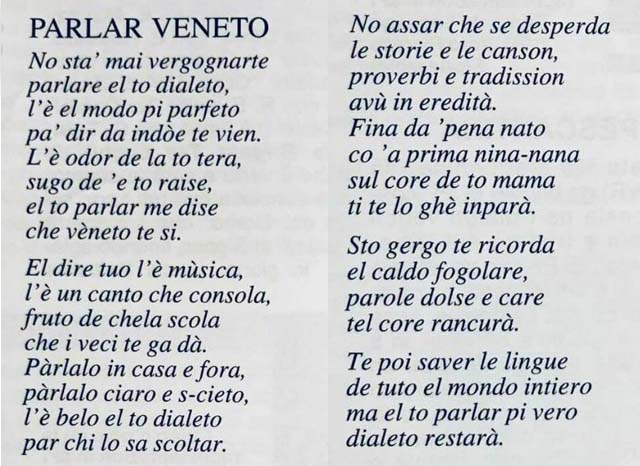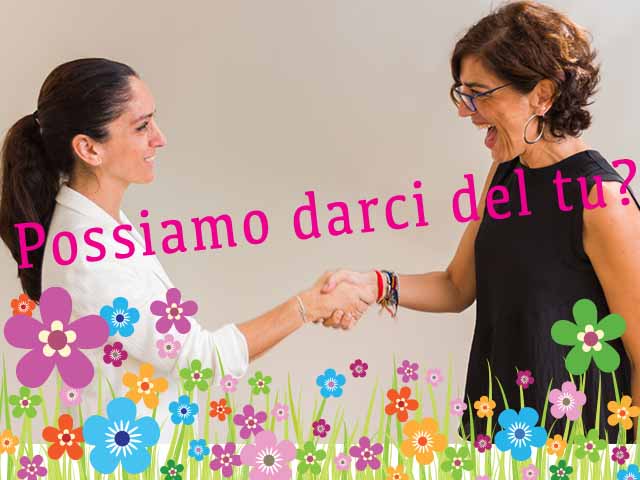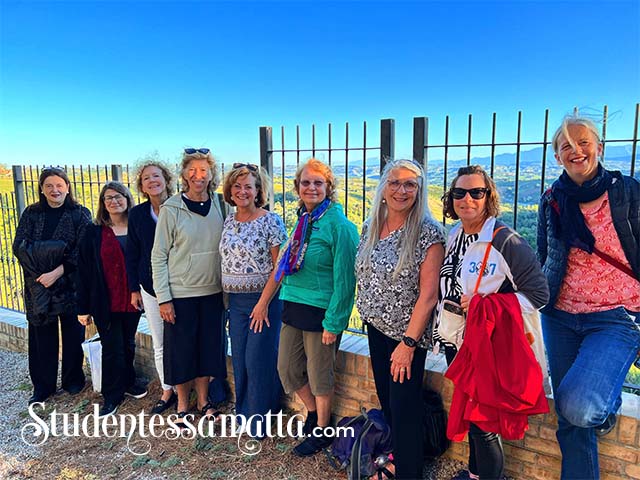
Oggi sono contenta di presentarvi Roberta un’insegnante di Italiano che abita a Firenze. Tra poco offriremo un Homestay a Firenze con Roberta. Nella sua prima apparenza qui sul blog lei scrive di diversi modi per imparare l’italiano.
Today I’m happy to introduce you to Roberta, an Italian teacher who lives in Florence. Soon we will be offering an Italian Language Homestay in Florence with Roberta. In her first appearance here on the blog, she writes about different ways to learn Italian.
Roberta’s 11 Tips to Learn Italian

Se state leggendo il blog di Melissa è perché state pensando di imparare o state imparando la lingua più bella del mondo. BRAVI
If you are reading Melissa’s blog, it is because you are thinking of learning or you are learning the most beautiful language in the world. Good!
Se non sapete da dove cominciare o se all’inizio avete ingenuamente pensato che studiare una lingua sia come imparare ad andare in vespa o a fare un tiramisù, fermatevi!! La lingua è il risultato di una magica combinazione tra storia, posizione geografica, società, costumi e tradizioni e per farla propria ci vogliono motivazione, spirito d’iniziativa, i giusti strumenti e una buona dose di pazzia.
If you do not know where to start or if you naively thought that studying a language is like learning to drive a Vespa or make a tiramisu, stop! Language is the result of a magical combination of history, geographic location, society, customs, and traditions, and to make it our own, it takes motivation, initiative, the right tools, and a good dose of madness.
Prendetevi un po’ di tempo per leggere 11 semplici consigli che ho scritto per voi, sperando vi possano essere utili.
Take a little time to read 11 simple tips that I have written for you. I hope you will find them useful.
Cominciamo!! / Let’s begin!

1) Rispolverate le vecchie lezioni di musica o testate le vostre abilità canore. Avete mai notato che gli italiani quando parlano sembra che cantino? Ebbene, nella lingua parlata non è possibile distinguere una frase affermativa da un’interrogativa, se non intonando un motivetto allegro alla fine della frase. L’intonazione è fondamentale per esprimere richieste chiare ed efficaci e non creare fraintendimenti: “ci vediamo domani!” o “ci vediamo domani?”? Provate a fare pratica e ascoltate “Radio Italia, solo musica italiana”, aiuta sempre.
1) Dust of an old music book and test you’re your singing skills. Have you ever noticed that when Italians talk they seem to sing? Well, in spoken language it is not possible to distinguish an affirmative sentence from a question, if not for intoning a cheerful tune at the end of the sentence. The intonation is fundamental to expressing clear and effective requests and not creating misunderstandings: “see you tomorrow!” or “see you tomorrow?” Try practicing and listening to “Radio Italia” that only plays Italian music. It is a great help.

2) Dimenticate la logica della vostra lingua madre. Dato che due lingue differenti spesso non hanno la stessa ricchezza o logica semantica ed esistono moltissime espressioni idiomatiche, non sempre è possibile tradurre gli enunciati con strutture equivalenti. In altre parole? Quando i miei studenti mi dicono, “Roberta perché in italiano si dice così? Non ha senso!!!!” Beh, talvolta non c’è una risposta, è così e basta, quindi cercate di accettare questo assunto fin dall’inizio.
2) Forget the logic of your mother tongue. Since two languages often do not have the same richness or semantic logic and there are many idiomatic expressions, it is not always possible to translate sentences with equivalent structures. In other words? When my students tell me “Roberta, why do you say that in Italian? It makes no sense!!!” Well, sometimes there is no answer; that’s the way it is, so try to accept this assumption from the beginning.
3) Dimenticate il gender correct/gender neutrality. Nella mia lingua non esiste un genere neutro, perciò non sentitevi maschilisti quando prendete una “posizione” di genere mentre parlate. Qui tutto è femminile o maschile, compresi gli oggetti e, anche se stiamo cercando di evolverci (piano piano), oggi la donna risulta spesso nascosta dietro il genere maschile: ingegnere e non ingegnera, sindaco e non sindaca…ecc. Stay tuned—rimanete sintonizzati, forse tra qualche decennio questo uso “discriminatorio” della lingua sarà superato.
3 Forget the gender correct / gender neutrality. In my language there is no neuter tense, so don’t feel sexist when you take the “position” of masculine or feminine nouns when you speak. Here (in Italian) everything is either feminine or masculine, including the objects and even if we are trying to evolve (slowly), today the woman is often hidden behind the male gender: ingegnere e non ingegnera, sindaco e non sindaca…etc. Stay tuned—perhaps in a few decades this “discriminatory” use of the language will be overcome.

4) Non frequentate solo expat. Se avete deciso di trasferirvi in una città italiana ma siete abbastanza illuminati da volervi immergere nella cultura e nella lingua, non è molto utile circondarvi solo di persone che parlano il vostro idioma. Lo so, è più naturale e umano, in un paese nuovo, cercare di ricreare la propria “confort zone”, noi italiani all’estero lo facciamo sempre! Ma voi noooooo: superate le prime settimane di spaesamento, cercate di andare oltre l’imbarazzo e buttatevi nell’esperienza scioccante, ma arricchente e meravigliosa, di frequentare degli italiani. Lasciate a casa i pregiudizi e siate aperti di mente. Ricordatevi anche di fare prima un giorno di dieta se un amico italiano vi invita a cena!
4) Don’t just make friends with expats. If you have decided to move to an Italian city but you are enlightened enough to want to immerse yourself in culture and language, it is not very useful to surround yourself only with people who speak your native language. I know, it’s more natural and human, in a new country, trying to recreate your own “comfort zone,” —we Italian abroad always do it! But you noooo: overcome the first weeks of disorientation, try to go beyond the embarrassment and throw yourself into the shocking but enriching and wonderful experience of surrounding yourself with Italian friends. Leave your prejudices at home and be open minded. Just remember to diet the day you are going to an Italian friend’s house for dinner!

5) Non siamo francesi. Ok, forse con questa frase non sembrerò politicamente corretta, ma ho vissuto a Parigi e sono pronta ad assumermi le mie responsabilità. Quando mi sono trasferita nella Ville Lumière, avevo già studiato francese per 8 anni e potevo tranquillamente ordinare il cibo al ristorante, ma non avevo una pronuncia perfetta. Risultato? Quasi nessuno mi rispondeva e mi prestava attenzione. Al contrario, gli italiani sono, in generale, positivamente stupiti dal fatto che uno straniero stia cercando di imparare la lingua e sono pazienti e pronti ad assecondarvi e ascoltarvi (ok, magari non nell’ora di punta al ristorante). Buttatevi e fatevi aiutare! Ps: adoro i francesi e la Francia.
5) We aren’t French. Ok, maybe this sentence is politically incorrect, but I lived in Paris and I’m ready to back up this statement. When I moved to Ville Lumière, I had already studied French for eight years and could easily order food at the restaurant, but I did not have perfect pronunciation. Result? Almost no one answered me and paid me zero attention. On the contrary, Italians are generally positively surprised by the fact that a foreigner is trying to learn the language and are patient and ready to support and listen to you (ok, maybe not at rush hour in a restaurant). But go on! Throw yourself. It is a big help. P.s. I adore the French and France.

6) The body language. Credo che i gesti e i movimenti del corpo non siano per noi solo un modo per arricchire la parlata, ma anche un modo importante per parlare. Senza nemmeno bisogno di un suono, in italiano è possibile capire che: il tuo collega sta uscendo prima dal lavoro perché ha fame, che andrà a mangiare degli spaghetti molto buoni, che ti invita a pranzo ma che devi fare presto perché non ha molto tempo! Per non parlare della quantità di insulti o apprezzamenti che si possono fare con le mani. Insomma, imparate a capire i gesti perché sono una vera e propria lingua!
6) Body language. I believe that the gestures and movements of the body are not for us just for us alone, but a means to enrich the spoken word and an essential way of communicating. Without even needing a sound, in Italian, it is possible to understand that: your colleague is leaving work because he is hungry, that he will eat a very good spaghetti, that he is inviting you to lunch. Still, you have to hurry because he doesn’t have a lot of time! Not to mention the number of insults or signs of appreciation you can communicate with your hands. In short, learn to understand gestures because they are a real language!
7) Leaning vs speaking. Imparare e parlare sono cose molto differenti. Non mi stancherò mai di dire che la lingua vera si parla per strada, nei supermercati, nei piccoli bar e nelle piccole botteghe storiche. Memorizzare delle frasi o riuscire a capirle non basta a farle vostre: duolingo è solo il primo step, la lingua è viva, comunicate e sbagliate!
7) Leaning vs speaking. Learning and speaking are very different things. I will never tire of saying that the real language is spoken on the streets, in supermarkets, in small bars and small artisan shops. Memorizing sentences or trying to understand stand rote phrases is not enough. You have to make these sentence your own: Duolingo is only the first step. The language is alive, communicate and make mistakes!

8) Vecchi film = vecchi stereotipi. L’Italia è davvero il paese del gelato, del mandolino, della pasta, della mafia, della dolce vita e dei mammoni? Penso che i tempi stiano cambiando e sebbene a mio parere gli stereotipi sull’Italia stimolano l’interesse per il paese (mafia esclusa), parte degli italiani potrebbe essere offesa da eccessive generalizzazioni. Considerate quindi che le cose potrebbero essere diverse da Eat-Pray-Love.
8) Old movies = Old Stereotypes. Is Italy the country of ice cream, mandolins, pasta, mafia, the sweet life, and mamma’s boys? I think the times are changing, and in my opinion, the stereotypes about Italy help create interest in the country (excluding those about the mafia); some Italian may be offended by the excessive generalizations. Consider movies that things are much different from movies like “Eat-Pray-Love.”
9) Burocrazia e Dialetti. A proposito di cose che invece NON cambiano…
9) Bureaucracy and Dialects. About things that do not change…
Numero uno: è importante sapere che la lingua della burocrazia—il burocratese—è molto diverso da ciò che studierete in una classe per stranieri. Nato per necessità giuridiche, il burocratese usa strutture e parole inutilmente complicate. Non sentitevi perciò frustrati se, dopo anni di studio, vi serviranno almeno 10 amici italiani e 1 avvocato per capire come prolungare il permesso di soggiorno! Help!
Number one: it is essential to know the language of the government. It differs from what you will study in a foreign language class. The bureaucracy uses unnecessarily complicated structures and words born out of judicial necessity. So do not feel frustrated if, after years of study, you will need at least 10 Italian friends and one lawyer to understand how to extend your residence permit! Help!

Numero due: pare che in Italia ci siano almeno una trentina di lingue/dialetti e negli ambienti non formali molti si esprimono non usando la lingua ufficiale, ma delle lingue territoriali a volte molto diverse dall’italiano. Ergo: se qualche volta non capite il nonno siciliano o veneto che vi chiede aiuto per portare la borsa della spesa è perché si sta rivolgendo a voi parlando in Veneto o in Siciliano!
Numero two: In Italy, there are at least thirty languages/dialects, and in non-formal environments, many express themselves not using the official language. Therefore, if sometimes you do not understand the Sicilian or Venetian grandfather who asks for your help to bring him the shopping bag, it is because he is addressing you speaking in Veneto or the Sicilian dialect.

10) In vino veritas. È difficile da spiegare e anche da capire, ma tutto sarà più chiaro dopo averlo provato personalmente…Mangiate e bevete come un italiano e con un italiano: per qualche ragione vi sentirete più sicuri di voi e padroneggerete meglio la lingua. Perché? È come se il cibo, il vino e le emozioni a essi correlate fossero strettamente connessi con la capacità di comunicare… è come una rivelazione improvvisa che vi aprirà la mente e aumenterà le vostre capacità cognitive. Con il vino siamo tutti più sciolti e le emozioni legate ad un contesto positivo amplificano e ridefiniscono i ricordi e la modalità di apprendere.
10) In wine, there is truth. It is difficult to explain and even understand, but everything will be clearer after you’ve personally tried it…Eat and drink like an Italian and with an Italian: for some reason, you will feel more confident and master the language better. Why? It is as if the food, wine, and emotions related to them are closely connected with the ability to communicate…It is like a sudden revelation that will open your mind and increase your cognitive abilities. With wine, we are all looser, and emotions linked to positive context amplify and redefine memories and the way we learn.
11) Have fun La grammatica, si sa, è importante, ma una volta ottenute le basi si può studiare in molti modi, non solo in maniera accademica. Usate canali youtube, serie tv, flashcards e trovate un insegnante che capisca i vostri interessi e sfrutti le vostre passioni per creare lezioni stimolanti e originali. Si può imparare ridendo.
11) Have fun Grammar, as you know, is important, but once you get the basics you can study in many ways, not just in an academic way. Use Youtube channels, TV series, flashcards and find a teacher who understands your interests and uses your passions to create stimulating and original lessons. You can learn laughing.

La lingua è come lo specchio dell’anima e riflette e influenza i nostri pensieri e la nostra visione del e sul mondo. Approcciatevi all’italiano vivo con curiosità e spensieratezza, preparandovi a ricevere in dono una nuova consapevolezza.
Language is like the mirror of the soul and reflects and influences our thoughts and our vision of and on the world. Approach Italian language learning with a carefree and curious approach and prepare to receive new insights about the reward.
Buon italiano a tutti!! – Roberta
If you liked this post, you might like these too:
Il vino fa cantare: Italian food and wine expressions












Cara Melissa,
Grazie tanto per il tuo recente blog , con Roberta e le 11 consigli per l’apprendimento di una lingua nuova , l’italiano .
Ho seguito i tuoi vlogs per un po’ di tempo e mi sono divertita moltissimi a leggere le tue
ultime notizie, insomma che tutti sono migliorata e arricchirsi ai miei vocabolari.
Il mio italiano non è troppo male dopo averlo studiato per quasi 5 anni, ma c’e sempre un po’
difficile parlare fluentemente.
Ho passato un mese a Bologna quest’autunno , nella scuola d ‘Arca, che aiutavo di parlare
più a mio agio . Ma allora quando sono ritornata , mi manca di sentire l’italiano parlato nella quotidianità.
Ebbene, continuo a leggere in italiano sul YouTube , anche i libri o reviste che m’interessano.
Mi sono reso conto che l’apprendimento una lingua nuova e per la vita.
Non vedo l’ora di sentirti e leggertelo del tuo prossimo blog.
Ciao, un caro saluto,
Veronika.
Ciao Veronika, grazie per il tuo messaggio. sono contenta di sentirti. che bell’esperienza stare a Bolgona per un mese! Hai ragione! non si smette mai con l’apprendimento di una nuova lingua. È molto divertente, no?
Stammi bene! A presto! Melissa